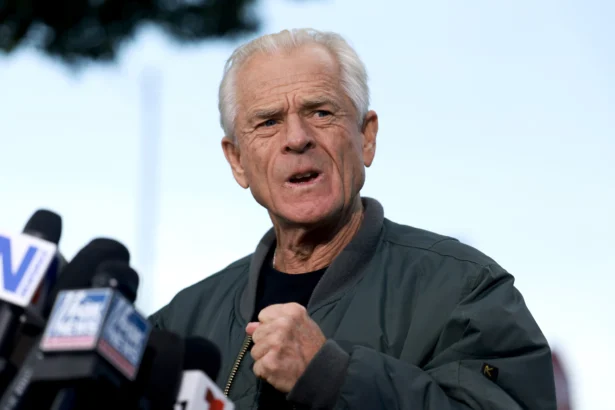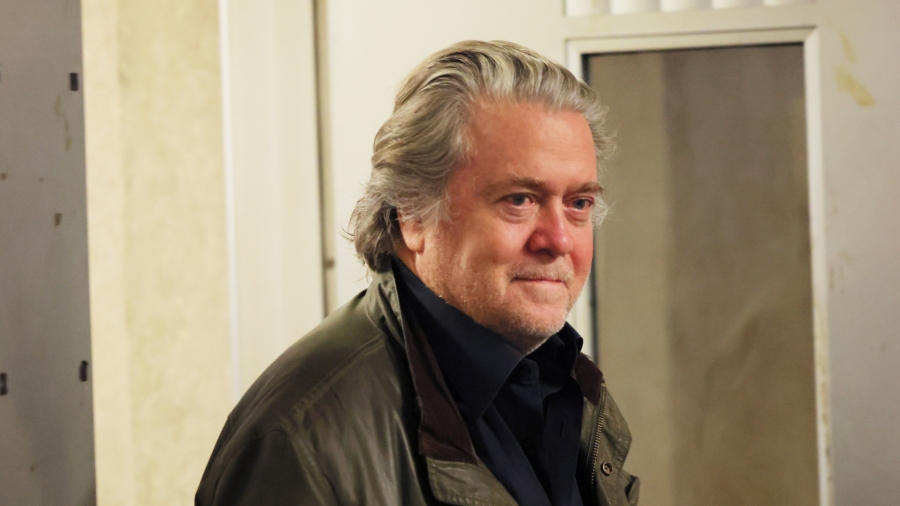A former adviser to ex-President Donald Trump was ordered on June 6 to surrender to prison by July 1 to serve a four-month sentence he received after being convicted of contempt of Congress.
U.S. District Judge Carl Nichols in federal court in Washington on Thursday granted prosecutors’ request to make Mr. Bannon, 70, start serving his prison term after a three-judge panel of a federal appeals court recently upheld his conviction.
But Judge Nichols, an appointee of President Trump, also said Mr. Bannon could seek a stay of his order. If a stay is granted, that could delay the surrender date.
Outside the courthouse, Mr. Bannon told reporters: “I’ve got great lawyers, and we’re going to go all the way to the Supreme Court if we have to.”
He also said that prosecutors would “not shut up Bannon, and they’re certainly not going to shut up MAGA,” or the Make America Great Again movement.
Mr. Bannon briefly worked for the White House during the early days of the Trump administration but departed in the fall of 2017. He transitioned to hosting a program called “War Room.”
‘Substantial Question of Law’?
Judge Nichols previously sentenced Mr. Bannon to time in prison for violating a federal law called section 192 that prohibits defying congressional subpoenas, but allowed Mr. Bannon to remain free while he fought his conviction. He said that Mr. Bannon’s appeal “raises a substantial question of law that is likely to result in a reversal or an order for a new trial.”
A U.S. Court of Appeals for the D.C. Circuit panel in May then rejected Mr. Bannon’s arguments that he was wrongly convicted. The arguments centered in part on how Mr. Bannon was relying on advice from counsel when he defied a subpoena from a U.S. House of Representatives panel investigating the Jan. 6, 2021, breach of the U.S. Capitol.
The appeals court “has squarely held that ‘willfully’ in Section 192 means only that the defendant deliberately and intentionally refused to comply with a congressional subpoena, and that this exact ‘advice of counsel’ defense is no defense at all,” U.S. Circuit Judge Bradley Garcia, an appointee of President Joe Biden, wrote for the panel.
Prosecutors then asked Judge Nichols to force Mr. Bannon to begin serving his sentence, in light of the ruling.
“There is no longer a ‘substantial question of law that is likely to result in a reversal or an order for a new trial,’” prosecutors said.
Lawyers for Mr. Bannon urged Judge Nichols to deny the prosecutorial request. They said they plan to ask the full U.S. Circuit Court of Appeals and the U.S. Supreme Court, if necessary, to review the matter and argued it would be unfair to send Mr. Bannon to prison now because he would have already completed his sentence before those rulings could be handed down.
“That might serve a political agenda; but it would be a grave injustice,” the lawyers said.
David Schoen, one of the lawyers, told reporters after Thursday’s hearing that the fundamental principle of law to be considered by the Supreme Court is how “willfully in the criminal context means that you knew you did something wrong.”
Section 192 opens up any person who is subpoenaed by Congress and “willfully makes default or who, having appeared, refuses to answer any question pertinent to the question under inquiry” to be found guilty and sentenced to up to one year in prison.
“The unequivocal evidence in this case, without any dispute, is that Mr. Bannon never got the subpoena. His lawyer got the subpoena, and his lawyer told him an executive privilege has been invoked. President Trump confirmed that and his lawyer told him that when executive privilege has been invoked, you may not, as a matter of law, comply with this subpoena,” Mr. Schoen said.
Mr. Bannon offered to testify once the committee worked out the privilege matter with President Trump but the committee opted to turn to the courts instead.

Navarro in Prison
A second former aide to President Trump, Peter Navarro, was also convicted of contempt of Congress because he would not cooperate with the Jan. 6 committee.
Mr. Navarro had maintained that he couldn’t cooperate with the committee because President Trump had invoked executive privilege, but courts rejected that argument, finding Mr. Navarro couldn’t prove President Trump had actually invoked it.
Mr. Navarro’s bid to stay out of prison as he appealed his conviction was turned down by U.S. District Judge Amit Mehta, an appointee of former President Barack Obama. The judge’s order was upheld by the appeals court and the Supreme Court, resulting in Mr. Navarro beginning his four-month sentence in March.
The Associated Press contributed to this report.
This is a developing story that will be updated.
From The Epoch Times

